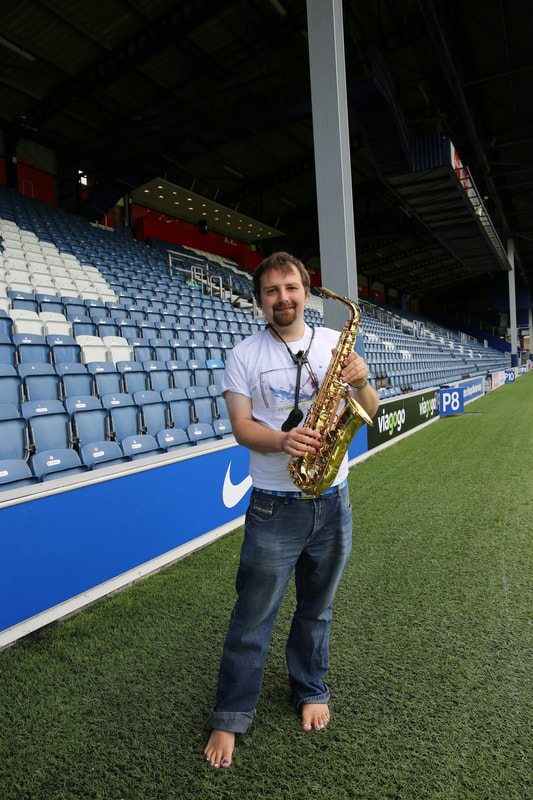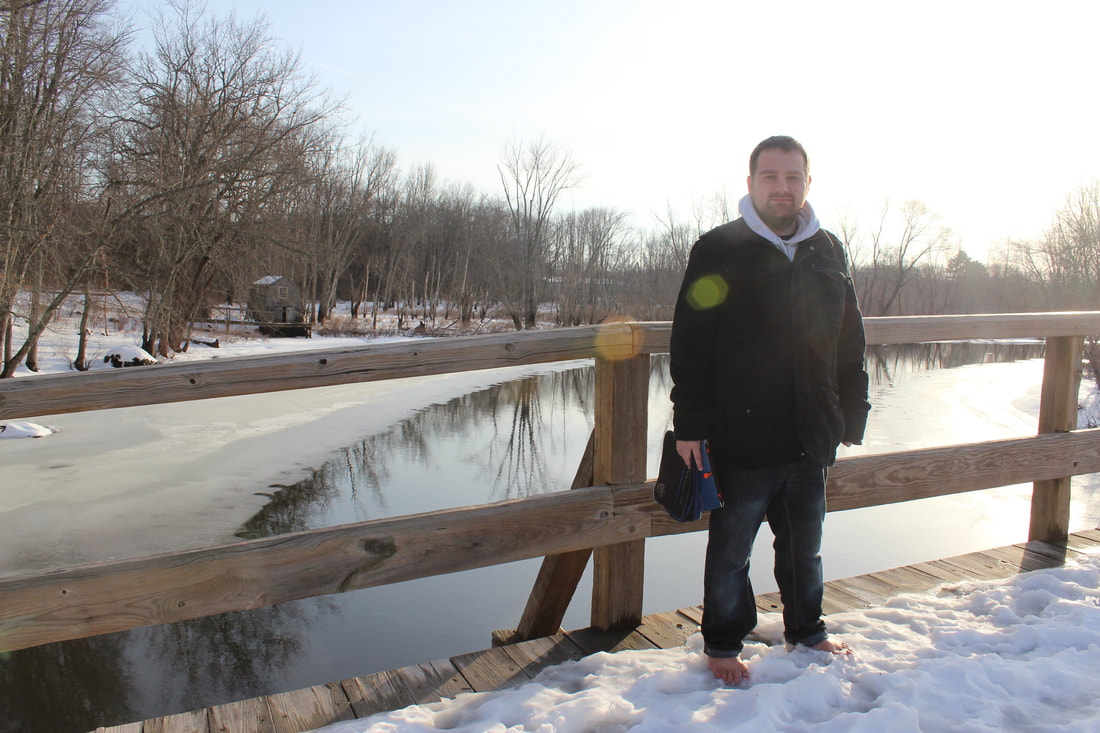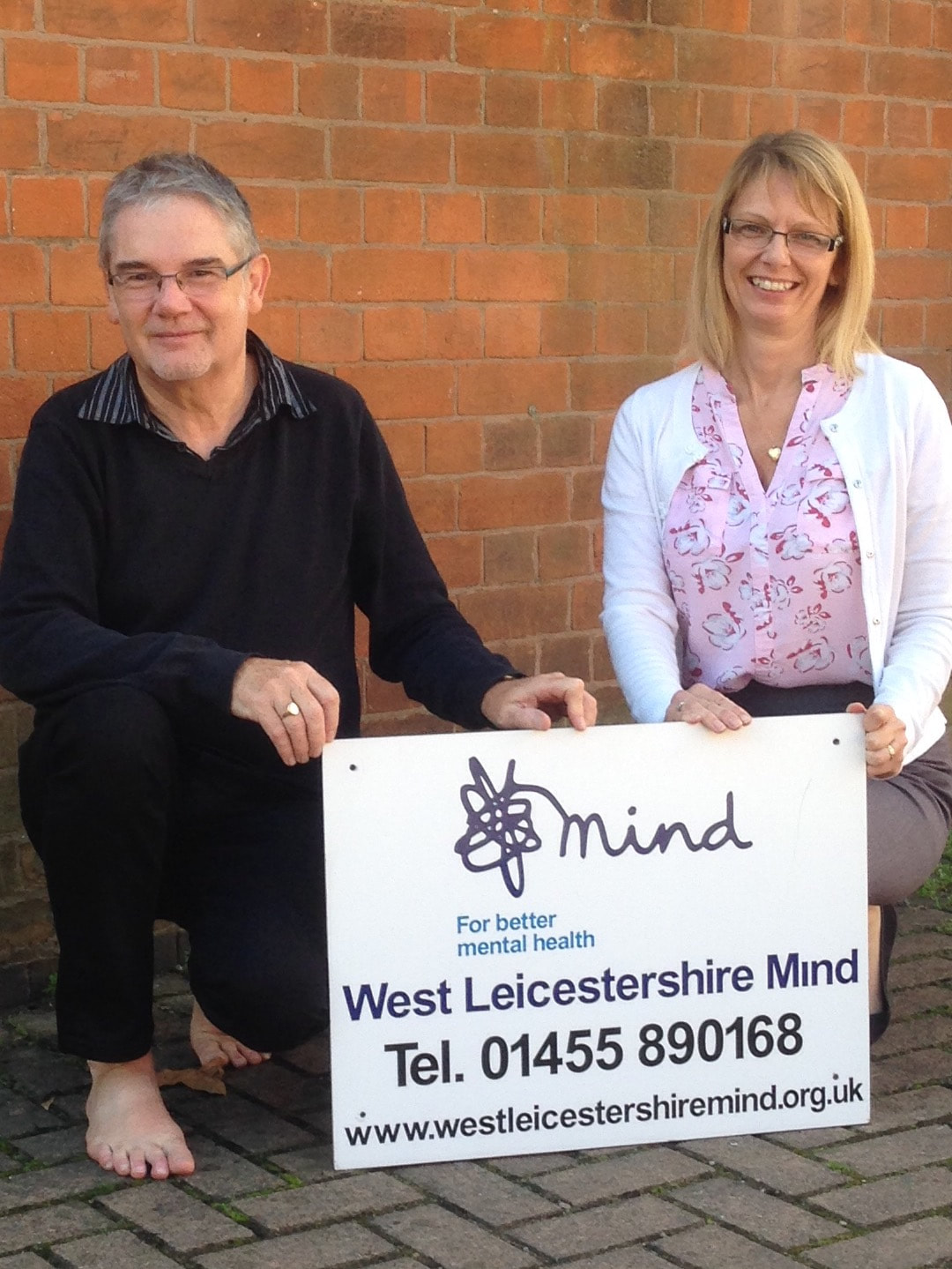He hasn’t worn shoes for years, and in fact no longer keeps any at home.
Playing with a number of London jazz ensembles, big bands, and function bands, Ben is on the verge or releasing his second album of original songs with this own band Platonic Curry. When he’s not working he can often be seen at football stadia around the country supporting QPR, or in one of his local cinemas. He lives in Acton with his girlfriend Carolina.
Here he looks at some of the undisputable scientific facts as to why going barefoot is good for us - and debunks some of the myths which have been dressed up as science.
| I’ve been going barefoot for many years now. I started doing it properly, in that I made the decision not to care about how it would affect other people’s opinions of me, about 15 years ago not long after I’d left home for the first time and came to the realisation that it was part of my identity and I needed to own it, not hide it away as a guilty secret. From then I made the gradual progression to the point where I am now where I no longer keep any footwear at home. In fact my mother recently informed me she has given away all of the socks that were still technically mine, at her house to a refugee charity and in doing so she did a huge favour to me as well cementing my status as someone who really doesn’t need or want to wear anything on my feet, anywhere, ever. But it’s only been in the last 5-6 years when I started engaging with other barefooters on social media, instead of just the older and less popular society for barefoot living which has been around since before I first started using the internet back in the late 90s. |
And it’s only on social media that I’ve seen the recurrence of this strange, scientifically nonsensical, yet somehow irrepressible claim known as Earthing or Grounding. Now I can understand why people are attracted to it. When I think back to the start of my acceptance and ownership of bare feet as part of who I am, I remember first having to decide what I was going to say to people. How am I going to justify it? It’s so uncommon for people not to want to wear shoes that I’d better have a really good reason. So I can understand why some people while going through this themself might be delighted to hear about grounding. A scientific sounding idea that seems to make a scientific case for going barefoot. Just what they’re looking for, surely. They can answer all the questions asked to them with confidence that science is on their side!
Well I have good news and bad news for them, and for you. The good news is that science IS on your side. Going barefoot is very good for you and there is a strong scientific case to be made in favour of not wearing shoes. The bad news is that that scientific case is definitely not grounding/earthing, which as I shall explain, is nonsense and is just a case of scientific sounding terminology strung together in a nonsensical way to sound authoritative to unfamiliar ears, but embarrassingly ignorant to anyone who remembers their school science lessons.
So let’s remind ourselves of some of the claims made by advocates of grounding/earthing. Not everyone argues for all of the claims, nor does everyone limit to themselves only to the claims that don’t contradict each other. That should be a warning sign from the start! But here are a few:
- When we wear shoes we insulate ourselves electrically from the earth, cutting us off from any potential benefits of the flow of charged particles in or out of our bodies.
- When we build up too much static charge from friction of day to day activity it is harmful to us and therefore it is important to go barefoot in order to discharge it regularly.
- The body generates lots of dangerous free radicals which do harm to us. These can be dismissed from our bodies through our feet into the earth as an electrical discharge.
- We can also draw electrons up out of the earth into our bodies and gain extra energy just by virtue of going barefoot.
First of all, while it is true that shoes do insulate our feet electrically, our feet are not the only means of contact we have with the ground. We touch objects with are hands and brush past things with our bodies regularly throughout the day. Door handles, furniture, pets, other people. Even when we sleep on a bed at night we are relatively well earthed.
To the second claim I listed above I would say that the amount of insulation from shoes alone, can easily be overcome by levels of electrical charge much lower than would be expected, or dangerous to remain in the body at any one time. If you have that much charge in you that you should be worried about it, it will discharge through your shoes, or some other easier route to ground, for the same reason that if you touch a badly maintained electrical appliance you are likely to get an electric shock even with shoes on.
Thirdly, when grounding advocates make claims about free radicals, they are counting on people listening to them not to know what a free radical is. They’ll gamble on you thinking it has something to do with radioactivity, assuming it to be dangerously toxic. A free radical is simply an ion or ionic compound not attached to any molecular structure but chemically loose (as well as electrically loose) and carrying a charge. It will behave like any other charged particle, except it has a lot more mass because it contains one or more atomic nucleus which is orders of magnitude heavier than an electron. It’s unlikely to flow through a layer of skin because it is so much bigger than an electron and may find a molecule to attach to, or else simply continue existing not doing very much, similar to the dissolved potassium and sodium ions in the mineral water (or tap water for that matter) that you drink.
And lastly, the silliest claim of all:
Electrons do not flow out of the earth. That's not how negatively charged particles behave. Electric charge flows into the earth. It's why electronic appliances are earthed for safety so that excess current has a route to ground where it is attracted that doesn't involve travelling through anyone's body. Grounding claims consistently misuse scientific terms to pretend that the nonsense is scientific.
But as I said there is a scientific explanation of why going barefoot is good for you, why it feels good and why it makes you happier but it has nothing whatsoever to do with charged particles, conductivity, electrons or anything flowing between the earth and the body in either direction.
There are basically three components to it. One: Efficiency of movement. Two: temperature control. Three: psychological boost/sensory information.
1) When you walk barefoot you allow the individual bones and muscles in each foot (26 bones if I remember correctly) to do their specific jobs that lead to the most energy efficient and least phsyically stressful way of walking. It doesn't just benefit your feet but your knees, hips and backs as every part of your body has a role to play and has to take some of the stress of the impact and of carrying your body weight. Your feet can allow you to efficiently transfer your kinetic energy (not a woo term - it just means the energy of your motion) from one step to the next making you feel light and agile. You don't lose energy from the cushioning of shoes and therefore don't have to push off with each step again - you just bounce along while your arches in your feet act as springs to store energy and release it as you step.
2) A lot of your body heat escapes through your feet and like your hands, your feet are really good temperature sensors. Going barefoot and directly gauging the temperature of the ground beneath you allows your body to regulate its temperature based on how much heat you're losing to your environment, or in hot weather allows excess heat to escape through your feet - something that just can't happen very well if your soles are covered (even a pair of flipflops inhibits this).
So that's basically it. Nothing overly technical. Nothing hiding in a load of badly used scientific terms. And nothing that contradicts every scientific experiment ever performed. It should be very easy for anyone to understand
On the other hand, Earthing/Grounding is a failed hypothesis. The evidence that proves it false was discovered by other scientists hundreds of years before anyone ever thought of it and no new evidence has been brought forth to support it today (and if anyone did, manage to, they would also have to explain how computers and other electronic devices can possibly work, because the claims made by grounding advocates directly contradict the way they work.)
In simple terms, the fact that I'm writing this on one device and you're reading it on another continent is proof that Grounding doesn't work.
But it’s worse than that, because grounding doesn’t even explain the benefits of going barefoot that are exclusive to going barefoot. You could wear copper soled shoes all day and be just as well earthed as if you were barefoot all day. You could also go barefoot all day but spend the whole day on a thickly insulated floor up in a tall building. You’re can feel benefits of going barefoot without being earthed. But if you’re earthed and not barefoot, which is equally possible, you get very little benefit because by not being barefoot you’re eliminating all of the benefits I described above. This is another aspect of why the grounding hypothesis is so unscientific. It attributes the benefits of going barefoot to Earthing without making any attempt to show that being barefoot is not the cause of such benefits.
Going barefoot is great. It's healthy, it's fun, it's actually the best option for almost everyone on the planet. We don't need nonsense like to support that. The truth is enough. Now I have heard people often ask another question that deserves a proper answer: Even if it’s nonsense, if it encourages more people to go barefoot, isn’t that a good thing anyway?
Well, there are two big problems here. First of all, let’s consider the way in which it encourages people to go barefoot. It doesn’t do very much to people who are much happier keeping their shoes on. Even if they believe it, they will find other ways to earth themselves on a regular basis. Lots of people love wearing shoes. A lot. And they hate going barefoot. It’s just not for them and no-one’s going to change their minds, sad to say. If they believe that they need to earth themselves they will find other ways to do it. So apart from them, that leaves the people who want to go barefoot, and probably are going barefoot already but are just looking for ways to answer the questions they get asked so they can justify their choice to friends, family and complete strangers. In this case, it seems that may the grounding idea, even though false, has something to offer them. Except unfortunately, it’s a false friend that will betray them in an instant. They may mentioning grounding the first few times they’re asked why they go barefoot and feel more and more confident about it. They’ll forget the reasons why they wanted to go barefoot in the first place – the simple ones such as “I like how it feels”, or “It helps me keep my balance”, or “Shoes make my feet uncomfortable”, and so forth. And instead they’ll go on bamboozling the untrained listener with fascinating scientific sounding terminology. And then one day they’ll be in a conversation with someone who was particularly good and attentive in their school science lessons, or may even have a physics degree. And then they’ll hit a very hard, painful and unforgiving wall. Because whatever they say about grounding will be challenged, much in the same way that I’ve challenged it here. And then what are they left with? They have claimed that that was their best reason to go barefoot, and now it turns out to be rubbish. They now have no reason to go barefoot and ought to put their shoes back on, at least when out and about where other people can see and judge them. And they end up worse than when they started because they have replaced the uncertainty of “what will people think?” with the experience of “wow, I have been talking nonsense all this time and I got found out! Going barefoot is a really bad idea”.
The second big problem is the impact it has on the reputation of the general practice of going barefoot. Anyone like me seen wandering around barefoot is immediately put into that catergory ahead of any other, in the same way that people get categorised by race or religion – the most obvious thing that someone notices about you gives you your label and you are judged alongside everyone else of the same label. So if barefooters get known for being advocates of pseudoscience, who choose not to wear shoes for no reason better than drawing physics-defying electrons out of the earth through their feet, then it hurts all of us. This has already begun to happen. Look up the various anti-pseudoscience pages on facebook and you’ll see among all the memes making fun of all different kinds of mind boggling credulity, are memes about the belief of grounding. There you’ll see how ridiculous it is in the eyes of the scientifically literate. And they do not (sadly uncharacteristically unscientific of them) make the distinction between barefooter and earthing advocate, because until someone like me goes in and tries to explain that we’re not all like that, they’ll have never encountered anyone who doesn’t fall into both categories.
I’d just like to leave you with this thought: When you made that decision to go barefoot in places where most people wear shoes, what was your main reason? It doesn’t have to be a fancy technical one. It doesn’t have to be a reason that applies to lots of people. It doesn’t even have to be that interesting. It only needs to be true for you, to the point that you know that you will be better off and happier barefoot all the time and can explain it to anyone interested enough to ask. THAT is why you are a barefooter. Not grounding, nor any of the other reasons I’ve given that might apply to me, or indeed to many people but not necessarily to you. Your reasons, as long as they make sense are all you need. Once you know them well enough to be honest with yourself, then rattling them off to other people is child’s play. From then on you can answer any other questions that arise just as easily and it gets even easier as you get more experienced. “Doesn’t it hurt?” Well once you’ve been doing it for a few months you know the answer to that. “What about in winter?” Once you’ve been through a whole winter you’ll know the answer to that too. And don’t be afraid to say “I haven’t done a winter yet, I’ll let you know in March (or October if you live in the Southern hemisphere)!” “I prefer it” is good enough if you don’t want to say anything more. Just whatever you say, own it and say it confidently as if it should be obvious. Eventually you won’t even have to say anything as your confidence will be evident in you walk and facial expression.







 RSS Feed
RSS Feed
